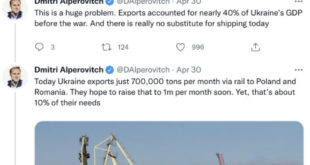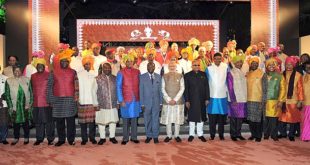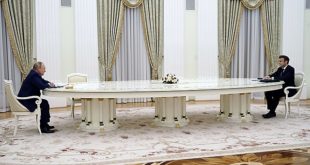Episode 65 of the Irregular Warfare Podcast explores why violence occurs from the local to the geopolitical level and how conflict can revert back to peace. Our guests today begin by asserting that peace—and not war—is the natural order of things for the human race. They then propose and identify five theoretical mechanisms that cause breakdowns in societies and discuss why different groups end up resorting to violence. Our guests then compare and contrast the characteristics of...
Read More »The prospects for war with China: Why I see a serious chance of World War III in the next decade
When I wrote my book on war, I avoided ongoing conflicts because I didn’t want the book to be dated the moment it came out. The roots of war and the paths to peace are timeless, and I wanted examples that made this permanence clear. Still, it was hard not to read obsessively about the conflicts facing today’s world and develop opinions. Over the next few months I plan to write a series on some of the most troublesome conflicts, and what I think social science has to say about them. I’ll...
Read More »America’s path to war with Russia
That’s the title of my feature with RealClearDefense, published this weekend. Full text follows here. The Biden administration has worked hard to keep Russia from treating America as a co-combatant in Ukraine. But that doesn’t mean NATO isn’t deeply embroiled in the fight. The level of support is extraordinary and increasing, including sanctions, intelligence sharing, weapons transfers, and money. Add to that the ever-heightening political rhetoric: “The United States is in this to win...
Read More »Two articles on Russia and Ukraine
Between 1998 and 2003, Ksenia Yudaeva and Konstantin Sonin were colleagues, first at the Russian-European Center for Economic Policy and then at the Center for Economic and Financial Research and Development. After Russia invaded Ukraine in February 2022, Sonin (now a professor at the University of Chicago) reached out to Yudaeva (who today serves as the first deputy governor of the Central Bank). Fearing data insecurity on Facebook and Telegram, she asked him to install Signal....
Read More »Will China invade Taiwan, and what (if anything) can the United States do about it?
Last week I wrote a long thread about whether and why China would invade Taiwan: Will China invade Taiwan? Did Biden’s remarks today make war more or less likely? I’ve been reading up on this a lot lately. Here’s a summary of the best things I read, and what could lead to a war. Mostly I’m reassured. But not entirely. A ?, obviously. pic.twitter.com/ooLwXItxgB — Chris Blattman (@cblatts) May 23, 2022 I’ll write up what the analysts and the theory say as a longer post this summer....
Read More »Why I think the west should support Ukraine big time, but also why we shouldn’t ignore the risks
That is my op-ed today in the L.A. Times. I really do think the ruin of war is a useful lens to look at conflict. It also helps us see how this conflict might end, why it might end faster if NATO is unconditional in its support for Ukraine, and why I think that stance is worth the great risks it entails. First, the rest of the op-ed:Even Vladimir Putin, author of the world-changing conflict in Ukraine, tried to avoid war in his own insidious way. For two decades, he employed every underhanded...
Read More »How much longer can Ukraine and Russia continue to fight, and what are the prospects for escalation versus stalemate?
Dmitri Alperovitch asks how Ukraine will pay for its war if it cannot export in this thread: Let’s talk about the state of the war and one of the most underreported yet crucially important issues: Russian blockade of Ukrainian ports and resulting strangulation of the country’s economy ? — Dmitri Alperovitch (@DAlperovitch) April 30, 2022 The full thread is worth reading but here is the key part: Last week I pointed to Yuriy Gorodnichenko‘s estimate that Ukraine needed about 40-50% of...
Read More »What are the prospects for a long war of attrition in Ukraine?
How long will the Russian war in Ukraine continue? The Russian aggression has no end in sight and so Ukraine should prepare for a war of attrition. In other words, it will be not only a fight of armed forces but also an economic competition. Who can procure more weapons? Who can muster more materiel? Who has larger reserves? That is UC Berkeley economist (and Ukrainian) Yuriy Gorodnichenko in Vox Ukraine. He writes about lessons from war mobilization of the US and European economies. But the...
Read More »Why are so many African and Asian nations ambivalent about Russia’s invasion? International identity politics
Americans agree on few issues, but one thing they have come together on is condemnation of Russian aggression. Western Europeans too. But not so the rest of the world. To explain India’s muted diplomatic reaction, Western papers emphasize the fact that India gets most of its arms from Russia, but here is an interesting NPR panel broadening the view: FRAYER: And the news commentary here about sanctions and diplomacy is also often sympathetic to Russia. Listen to how one of India’s most...
Read More »The new Kashmir: How I think the Russia-Ukraine conflict could play out
After reading many things, talking to colleagues knowledgable about Russia, thinking about parallels to other conflicts, and idly speculating about a place that five months ago I struggled to find on an unlabelled map, here are some thoughts. One plausible scenario is that we are looking at the next Kashmir—something that will soon evolve into a tense but durable “peace” without any real settlement, but at least one where few people are dying. For the next while there will be more fighting...
Read More » Heterodox
Heterodox



